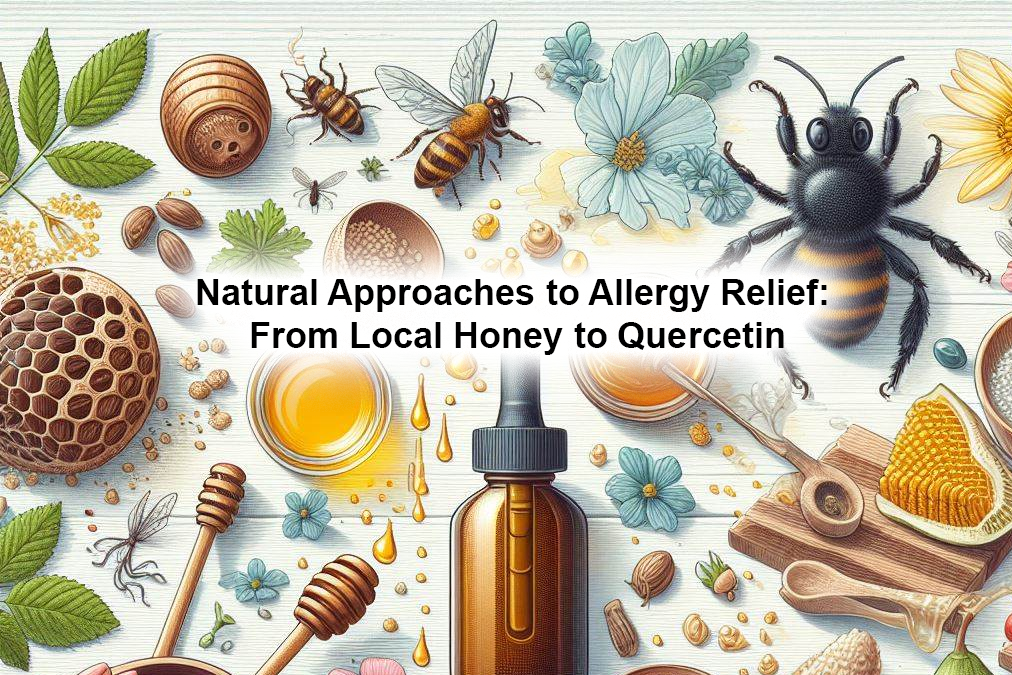Understanding Allergies and Natural Remedies
Allergies affect millions worldwide, prompting many to seek natural relief. From local honey to quercetin, natural remedies abound. But how effective are these approaches, and what’s the science behind them?
Exploring the Benefits of Local Honey
Local honey is often touted as a natural remedy for allergies. Proponents claim that consuming local honey can help desensitize the body to pollen, reducing allergy symptoms. While scientific evidence is limited, some studies suggest that honey might provide minor relief by exposing individuals to small amounts of pollen.
Harnessing the Power of Quercetin
Quercetin, a plant pigment found in many fruits and vegetables, has gained attention for its potential anti-allergic properties. Research indicates that quercetin may help stabilize mast cells, which play a key role in allergic reactions. However, more studies are needed to determine its effectiveness in allergy relief.
Examining Herbal Supplements
Herbal supplements like butterbur and stinging nettle are commonly used to alleviate allergy symptoms. Butterbur, in particular, has shown promise in reducing symptoms such as sneezing and nasal congestion. Stinging nettle may also offer relief due to its anti-inflammatory properties.
Incorporating Essential Oils
Essential oils such as lavender and peppermint are popular for their aromatic properties and potential health benefits. Some people believe that inhaling certain essential oils can help alleviate allergy symptoms. While research on this topic is ongoing, anecdotal evidence suggests that certain oils may provide relief for some individuals.
Adopting a Clean Diet
A healthy diet rich in fruits, vegetables, and omega-3 fatty acids may support overall immune health and reduce inflammation, potentially mitigating allergy symptoms. Foods high in antioxidants, such as berries and leafy greens, may also help combat allergic reactions by reducing oxidative stress in the body.
Practicing Nasal Irrigation
Nasal irrigation, commonly done using a saline solution, can help flush out allergens and irritants from the nasal passages, providing temporary relief from congestion and sinus pressure. This simple and inexpensive technique is often recommended as a complementary therapy for allergy sufferers.
Embracing Mind-Body Practices
Stress can exacerbate allergy symptoms, so incorporating relaxation techniques like yoga, meditation, and deep breathing exercises may help manage allergies. These practices promote overall well-being and may reduce the body’s inflammatory response to allergens.
Consulting with a Healthcare Professional
While natural remedies can be beneficial for some individuals, it’s essential to consult with a healthcare professional before starting any new treatment regimen, especially if you have severe allergies or underlying health conditions. A medical professional can offer personalized advice and ensure that any natural remedies are safe and effective for you.
Conclusion
Natural approaches to allergy relief, from local honey to quercetin, offer promising alternatives to traditional medications. By understanding the benefits and limitations of these remedies and consulting with a healthcare professional, individuals can take proactive steps towards managing their allergies and improving their quality of life.
Table Summarizing Natural Allergy Relief Methods
| Method | Description | Potential Benefits |
|---|---|---|
| Local Honey | Consumption of locally sourced honey to desensitize the body to pollen. | Minor relief from allergy symptoms due to exposure to small amounts of pollen. |
| Quercetin | Plant pigment found in fruits and vegetables with potential anti-allergic properties. | Stabilization of mast cells, potentially reducing allergic reactions. |
| Herbal Supplements | Use of herbs like butterbur and stinging nettle to alleviate allergy symptoms. | Reduction in sneezing, nasal congestion, and inflammation. |
| Essential Oils | Aromatic oils such as lavender and peppermint believed to provide relief from allergy symptoms. | Potential alleviation of symptoms through inhalation or topical application. |
| Clean Diet | Consumption of a diet rich in fruits, vegetables, and omega-3 fatty acids to support immune health and reduce inflammation. | Reduction in allergic reactions by combating oxidative stress in the body. |
| Nasal Irrigation | Flushing of nasal passages with saline solution to remove allergens and relieve congestion. | Temporary relief from congestion and sinus pressure. |
| Mind-Body Practices | Incorporation of relaxation techniques like yoga and meditation to manage stress and reduce inflammation. | Reduction in allergic symptoms by minimizing the body’s inflammatory response to allergens. |
FAQ
1. Is local honey an effective remedy for allergies?
Local honey may provide minor relief from allergy symptoms due to exposure to small amounts of pollen, but scientific evidence is limited.
2. What are the potential benefits of quercetin for allergy relief?
Quercetin has shown promise in stabilizing mast cells, which play a key role in allergic reactions, potentially reducing symptoms.
3. Are herbal supplements like butterbur and stinging nettle safe for allergy relief?
Herbal supplements can offer relief from allergy symptoms, but it’s essential to consult with a healthcare professional before use, especially if you have underlying health conditions.
4. How do essential oils like lavender and peppermint alleviate allergy symptoms?
Essential oils are believed to provide relief from allergy symptoms through inhalation or topical application, but more research is needed to confirm their effectiveness.
5. Can a clean diet help manage allergies?
A diet rich in fruits, vegetables, and omega-3 fatty acids may support immune health and reduce inflammation, potentially alleviating allergy symptoms.
6. Is nasal irrigation an effective method for allergy relief?
Nasal irrigation can provide temporary relief from congestion and sinus pressure by flushing out allergens and irritants from the nasal passages.
7. How can mind-body practices help alleviate allergy symptoms?
Relaxation techniques like yoga and meditation may reduce stress and inflammation, thereby minimizing the body’s inflammatory response to allergens and reducing symptoms.

